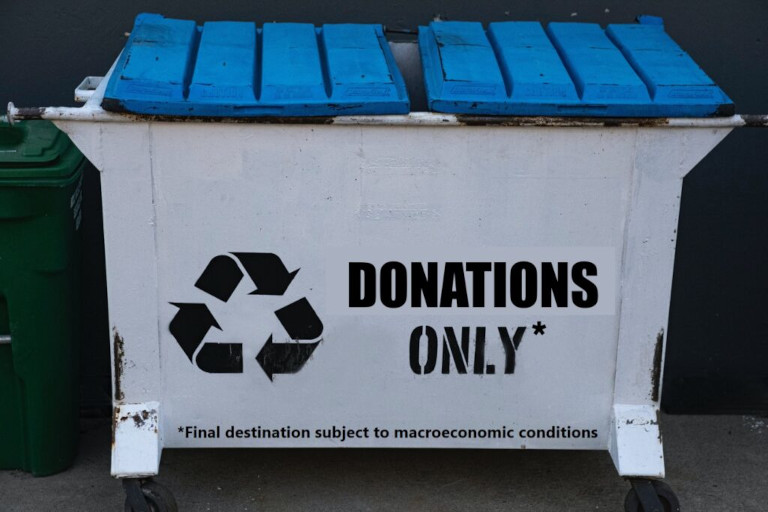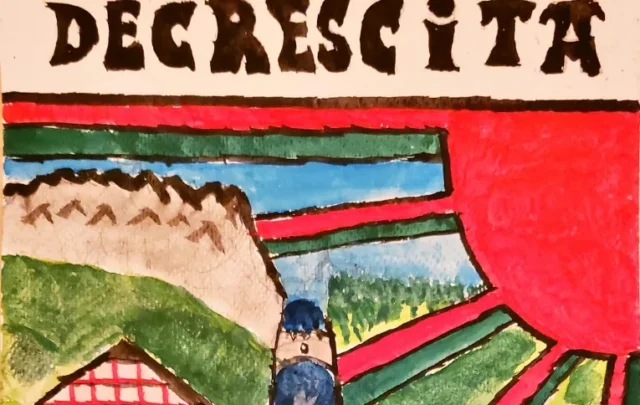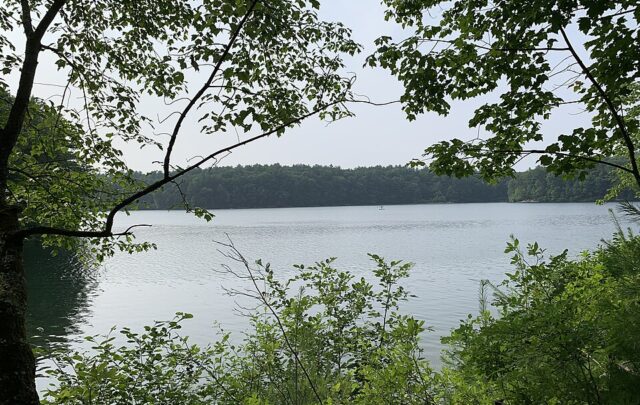There used to be a “Donations” bin – a small plastic dumpster really – on the loading dock of the apartment building where I live. It sat right beside the trash, cardboard, and mixed recycling dumpsters. It always seemed to fill up and empty on a weekly basis, but I recently realized I’d never actually seen the bin being picked up. I’d seen garbage and recycling trucks come and go, but no donation pickup services – something like a Goodwill or Salvation Army vehicle. One day I asked Jim from the building’s maintenance team about what happens with the Donation bin. I think he could tell I was suspicious. He asked, “Do you want the hard truth, or do you want the story we tell?” Of course, I wanted the hard truth.
Jim explained to me that there used to be a truck that came through on a route, picking up donations of clothing and household items from the surrounding apartment buildings. “That was before COVID,” he said. Since the service stopped in 2020, there’s been no news on when it may start up again. And even though residents were notified at some point, the collection bin stayed and “people keep bringing their stuff.” So what happens with all these donatable items then? Jim said every once in a while the maintenance team would pick out quality coats and warm clothing for the homeless folks who occupy nearby street corners. But other than that – we both gritted our teeth as he reached the looming conclusion – it goes in the trash. “We just haven’t had time to work out a solution,” he said.
Note the fine print. (Image from David McElwee via Pexels with modifications by Erik Assadourian)
This is the type of moment that used to get me in a stir. I would think, what a shame that all those donations are going to waste! And the response might be that I would start researching pickup services myself, perhaps organize neighbors to take shifts hauling the donations to the nearby Goodwill, and maybe even ponder an app or startup idea for revolutionizing the “urban donations” space. I’ve traditionally been one of those environmentalists who feels everything is urgent; who can’t walk out into public without seeing the planet slipping through our fingers – in every trash bin, gas-powered vehicle, and plastic water bottle I encounter.
From Sustainability to Degrowth
The urgency of sustainability kept me busy throughout college, rallying friends to change their lightbulbs and separate their food scraps, and for many years afterward as a corporate sustainability consultant. The biggest project I worked on was recycling and composting at Google’s California headquarters campus, for which I obsessively managed every detail down to the degradability of the little stickers on fresh produce. But that was also the project that broke my sense of urgency about the little things. It was clear to me, after just six months of working on the project, that for every scrap of material I saved from Google’s waste stream, a new scrap would be created by their unstoppable, even if playfully genius, growth machine.
Donation bins for clothing and electronics and a shared bike outside of Google’s headquarters. (Photo credit: John Mulrow)
Google’s workplace strategy was to ensure every employee’s needs were met – via free meals and snacks, gyms, yoga classes, entertainment, and even sleep pods – so that they could focus completely on their job throughout the workday. Really, for as many hours as humanly possible. The campus is famous for enabling Googlers to live, even thrive, off of the many amenities available to employees. A few months into the project I found myself asking where and if the needs of Googlers and their various projects might end. Tasked with handling all kinds of waste issues on campus, I was playing whack-a-mole against an ever-increasing array of apparent workplace requirements. I was simultaneously: advising the kitchenette team on the compostability of coffee cups, lids, and Keurig pods; seeking out recycling and donation opportunities for excess lumber and foam coming from the Self-Driving Car team; deciding on the most environmentally-friendly way to destroy prototypes for the Google X labs; and handling any and all requests to make employee events more “eco-friendly.”
At one point I met with a team manager – a guy about my age, articulate, giving off a hippy vibe, and clearly concerned about environmental issues. He was planning a “walk on water” event for his boss’s retirement party. The event would require a pond-sized hole to be dug in the ground, filled with water, and mixed with fifty 25-pound bags of corn starch to make for a slushy but walkable liquid surface. Could I ensure the corn starch slush, bags, and soil were “environmentally” handled? I staffed the event, got the soil restored, and ensured all the slush and paper bags made it into a compost bin. But the urgency of my sustainability actions, for me, went right into the food scrap dumpster with everything else. It was the proverbial last straw: Why solve waste problems for clients bent on using every scrap of savings to bring about ever-more human gadgetry, comforts, and material-intensive forms of “fun”?

Walking on water (and equal parts cornstarch). (Image by Kelly Hofer via Flickr)
The Hard Truth, In a Word
When I talk about my breakup with mainstream sustainability it can come across as pessimistic. But skepticism, informed by lived experience and empirical evidence, is not pessimism. My search for bolder and less harried environmental action eventually led me to degrowth. The degrowth movement is building collective and global resolve to put a limit on the size of the economy, for the purpose of maintaining a functional planet on which we, and other species, can thrive. The word sounds negative, since we tend to conflate growth with thriving, and many have criticized it for just this reason. At the 2023 Degrowth Conference in Zagreb, one of the keynote speakers, a vice chair of the IPCC, suggested to the crowd that they “find a better word.”
I wasn’t there, but I can easily imagine the crowd’s jeering reaction to such a proposal. Since starting Degrowth Coffee Hour with fellow researchers at Purdue, we are often asked to consider a different framing: utopian futures, human flourishing, a good life for all, even doughnut economics. But all of those terms are like the false donation bin, or the eco-friendly walk-on-water charade. They communicate a story, but not the hard truth about our ecological situation.
It’s the serious criticism inherent in degrowth that, I believe, attracts many of us to it. Corporate sustainability programs, promised techno-fixes, and green leaf logos are not altogether delivering reductions in planetary-scale ecological degradation. That fact alone has been enough to attract recovering sustainability professionals like me to degrowth. We have seen so many eco-promises come and go, in a perpetual cycle of hype followed by disappointment.
But degrowth is not just about naysaying conventional sustainability for its performance record. It looks forward, admitting that the human economy will not self-regulate within planetary boundaries without some system of restraint – be it cultural, spiritual, or legal. This is because needs and wants expand infinitely to fill the space opened up by new technology. The whole litany of bio-based, renewable, circular, and energy efficient eco-solutions only ends up freeing resources for economic expansion. These could be powerful solutions if paired with degrowth, and that’s what gives me hope. We don’t have to throw the techno-baby out with the sustainability bath water, we just have to pair the conventional litany with a managed limit on the size of the economy.
Ultimately, what I like about degrowth thinking is that it puts the hard truth up front. Admitting that the economy has outgrown the planet is not just inconvenient, it’s emotionally and politically difficult to process. It feels like bad news, but if it prompts meaningful action over green-leaf cover-ups then you could think of it as good news! That’s why my reaction to the donation bin’s trashy reality was decidedly not urgent or rushed. I simply asked the building management if they would remove the bin and let residents know that donations were no longer being collected. It seemed only right to deliver the hard truth to everyone and give people a chance to bring their own reusable items to a nearby donation center. Far better to burst people’s fantasy bubble than to continue the charade. Now, two months since the bin was removed, there has been no massive buildup of donatable items in the trash – meaning people are presumably making donation deliveries themselves, or thinking twice about their throw away habits. More importantly, the bin has been replaced with a large sign listing a variety of local drop-off locations – for everything from electronics and clothing to pharmaceuticals and Christmas trees. It feels good to know that the information to enable real action is there, even if the cheeriness of the fake-action donation bin is gone.
Degrowth: A Call to Action?
Ever since I first read about degrowth in 2012, the concept has made increasing sense to me. I’ve been to climate rallies, volunteered at countless urban gardens, gone vegetarian, strived for simplicity, consulted on corporate sustainability projects, and studied the life cycle impact of solar panels and electric vehicles. Nowhere in these experiences have I seen a pathway for global society, as a whole, to restrain itself from using new fuels and more-efficient technologies to claim more, not less, of the Earth for itself. Degrowth explicitly calls for less as a prerequisite for true sustainability action. All of our going-green activities could leave us with a smaller ecological footprint, but only if the savings are sequestered, not redeployed in the service of more.
A snail summarizes degrowth. (by Alex Grilanc from the DegrowUS Zine)
So how do we do degrowth? If we’re convinced that economic restraint is needed, what policies could point the way, what financial mechanisms could ensure equity, and what personal actions may be needed? These are the kind of questions that many in the degrowth movement are working to answer. But when I personally get these questions I always check on the initial condition: Are you convinced that economic restraint is needed, at a global scale? Many are not; especially among sustainability advocates, armed as they are with a list of technical fixes to global ecological degradation; fixes that could be powerful if paired with degrowth. The logic of mainstream sustainability is so stuck on technical artifacts that our ability to imagine their macroeconomic and cultural context has atrophied.
Degrowth calls, significantly, for the actions of discussing, debating, and imagining. The purpose of such actions is to develop our awareness of global interconnection and take better stock of what growth has and has not delivered, at a planetary scale. Then, we can pair the evidence for macroeconomic limits with the plurality of ideas for better-managing society and our relationship with all life on Earth. There are technical concepts to be developed as well: better measuring of planetary effects beyond climate change, forecasting the potential for unintended consequences such as backfire (via the Jevons Paradox), and fleshing out metrics and mechanisms to drive toward global equity. These are anchor points for researchers and advocacy organizations motivated to look beyond growth, toward degrowth.
Perhaps what the sustainability movement most needs is not more alternative products and technologies, but simply a confrontation with growth – something much less material. Thus, just talking about degrowth constitutes bold environmental action. And that is why we’re launching the Gaian Degrowth Pod (GDP, get it?). Where all questions and perspectives will be on the table as we dive into some spring reading. Please sign up and find out more here and join us for the first discussion on February 21st at 3pm ET.








